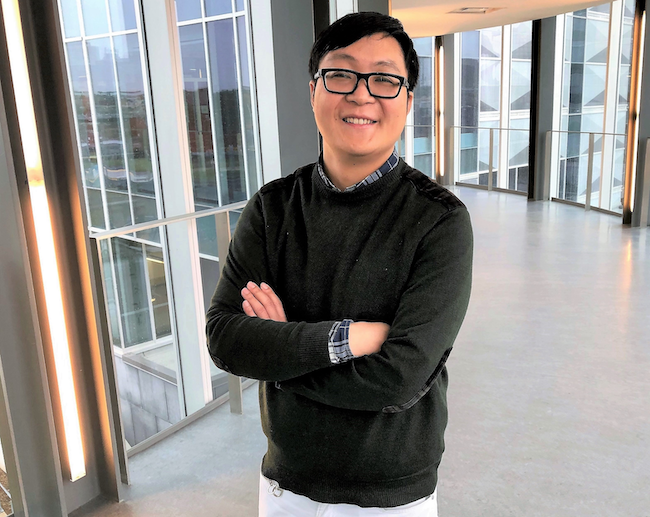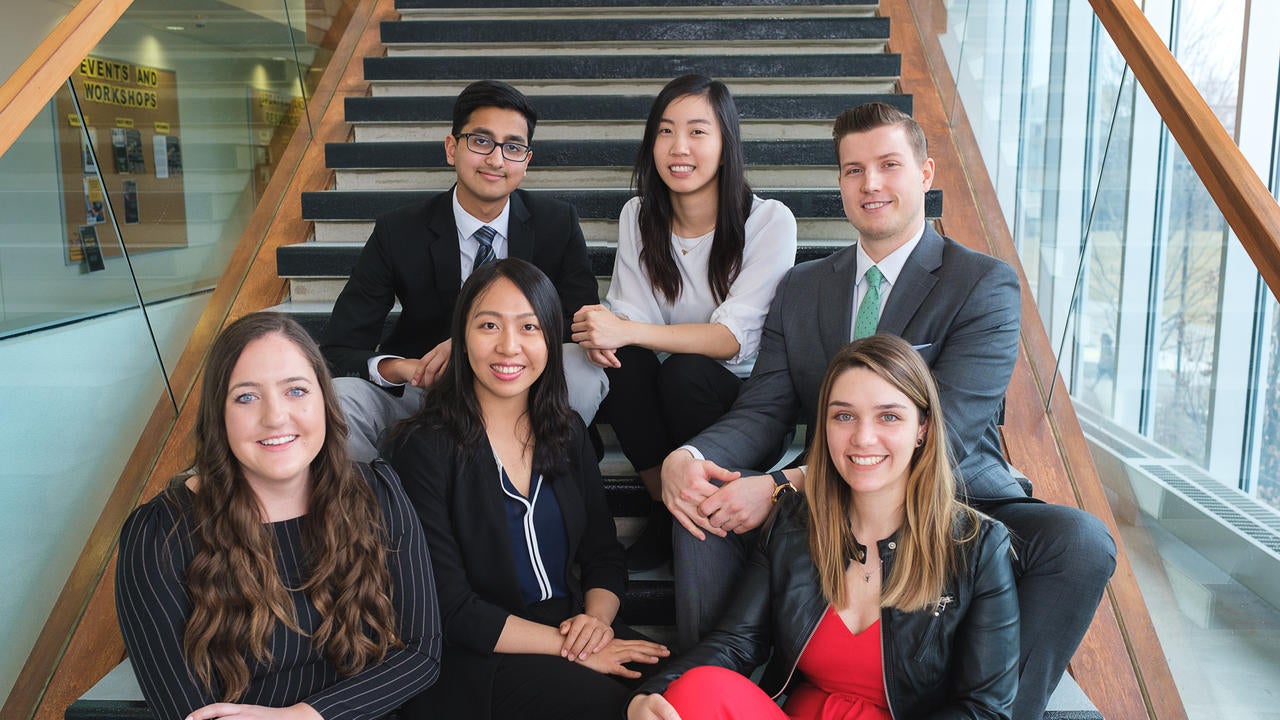
A year in review
Looking back at some of Waterloo’s leading stories in 2019

Looking back at some of Waterloo’s leading stories in 2019
By Natalie Quinlan University Relations2019 has been a year filled with new entrepreneurial adventures, new discoveries and honours that are globally recognized. Take a look at some of the top-performing stories from the past year as we head into 2020.
 Scientists have created an “artificial leaf” to fight climate change by inexpensively converting harmful carbon dioxide (CO2) into a useful alternative fuel. The new technology, inspired by the way plants use energy from sunlight to turn carbon dioxide into food, was led by Yimin Wu, an engineering professor at Waterloo.
Scientists have created an “artificial leaf” to fight climate change by inexpensively converting harmful carbon dioxide (CO2) into a useful alternative fuel. The new technology, inspired by the way plants use energy from sunlight to turn carbon dioxide into food, was led by Yimin Wu, an engineering professor at Waterloo.
Researchers develop a better way to harness the power of solar panels
Other Waterloo researchers like Milad Farsi, a PhD candidate in Waterloo’s Department of Applied Mathematics, have developed an algorithm that better harnesses the power of solar panels, regardless of fluctuations in conditions.
On April 10, 2019, a team of global collaborators showcased the first image of the supermassive black hole in the core of the massive elliptical galaxy M87. Helping lead the pack in this discovery was Waterloo’s Avery Broderick, professor with the Faculty of Science.
It’s time to wake up and do some physics
University of Waterloo physicist Anna Golubeva is using quantum theory to advance AI (and vice-versa). The PhD candidate is steadily establishing herself as one of the top young physicists connecting the dots between machine leaning and the heavy computing necessary to untangle webs of information produced by quantum many-body systems.
University of Waterloo launches program to deploy industry-driven quantum technologies
Transformative Quantum Technologies (TQT), a research initiative led by the University of Waterloo, launched the Quantum Alliance (QA) program, which brings together a collaborative community of researchers, world-class infrastructure and TQT’s unique Quantum Innovation Cycle for the advancement of impactful quantum technologies.
Waterloo alumnus Richard Yim grew up in Cambodia and recalls dinner table conversations where his family warned him of the explosive devices concealed underground. After learning that his aunt died from stepping on a landmine, Yim was determined to build a product that could defuse landmines safely and effectively.
Building the next generation of tech leaders in Africa
Facebook creator Mark Zuckerberg invested $180 million in startup, Andela. Andela takes the brightest and most brilliant math, tech and engineering minds in Africa and trains them to become accomplished, top-tier developers that go on to take full-time roles in more than 100 partner companies such as IBM, Microsoft and Viacom.
When Morteza Ahmadi visited a dialysis clinic, he saw what kidney dialysis patients endure. So, the systems design engineering PhD student from the University of Waterloo got to work, starting his company Qidni Labs and building an artificial kidney that will dramatically improve survival rates for patients.
Medtech startup tackles “silent epidemic”
It began with “Hack4Health” in 2015, where three Waterloo science students learned that bedsores were a critical issue for healthcare in North America costing seven lives an hour and up to $20B every year. Zied Etleb, Moazam Khan and Matthew Sefati decided to tackle the problem and develop smart products to prevent and manage pressure wounds. The co-founders called their startup company Curiato Inc.
A “second heart” to strengthen our golden years
Each year, millions of older people — those 65 years and above— fall. It is no wonder then that the fear of falling may cause older adults to sit out more, stay at home and disengage. This leads to overall worse health outcomes: less mobility, cognitive decline and increased frailty. It’s a cycle researcher Richard Hughson is committed to breaking thanks to a unique blood pressure study and medical technology that address the root causes of falls.
When tossing in a load of laundry, most of us have no idea that other people may unwittingly swallow tiny pieces of our yoga pants or bath towels. It’s a reality PhD student with the Faculty of Environment Lauren Smith wasn’t comfortable accepting. So, Lauren launched her startup PolygGone and developed a solution for keeping microfibre pollutants out of our waterways.
Waterloo medical startup wins first Entrepreneurship World Cup
A medical technology startup co-founded by two Waterloo Engineering students topped more than 100,000 applicants and secured the first-place of $500,000 prize in an international competition staged in Saudi Arabia. NERv Technology is developing a device to proactively detect leakage of gastrointestinal fluid into the abdominal cavity after surgery.
 Quacquarelli Symonds (QS) released their 2019 World University Rankings and once again, Waterloo finds itself standing amongst the best universities at home and around the world. Building momentum in several subjects and subject areas Waterloo has five subjects ranking among the top 50 universities in the world.
Quacquarelli Symonds (QS) released their 2019 World University Rankings and once again, Waterloo finds itself standing amongst the best universities at home and around the world. Building momentum in several subjects and subject areas Waterloo has five subjects ranking among the top 50 universities in the world.
2019 QS World University Rankings places computer science at Waterloo 22nd globally
Quacquarelli Symonds (QS) released its 2019 World University Rankings and once again Waterloo finds itself amongst the best universities in Canada and around the world. Building on momentum, computer science at Waterloo ranked 22ndglobally, up nine spots relative to the 2018 ranking.
 Every year, one co-op student from each faculty is recognized by the University of Waterloo for their contribution to their employer, community and the further development of experiential education.
Every year, one co-op student from each faculty is recognized by the University of Waterloo for their contribution to their employer, community and the further development of experiential education.
These incredible students found themselves in sectors as diverse as international aid and gaming. Several 2018 winners made strides in medicine, signaling Waterloo’s momentum as a health technology and service leader.
This year’s winners truly showcase what Waterloo students can accomplish at home and around the globe.
University of Waterloo creates billions in economic impact
Startup companies at the University of Waterloo's flagship entrepreneurship programs have generated more than $2 billion in revenue and around 7,500 jobs over about a decade, according to a major new report by Deloitte Canada. The third-party study also shows companies that hired Waterloo co-op students realized an additional $525-million in returns in 2018 alone.
Co-op education prepares students for medical school
For alumnus Natalie Pulenzas (BSc ’14), the University of Waterloo’s co-op program is what lead her to med school. In her second year of an honours kinesiology co-op program, Pulenzas became a clinical research assistant in the palliative radiation clinic at Sunnybrook Health Sciences Centre and returned to the same position in every subsequent co-op term. The experience solidified her desire to go to med school where she quickly realized that co-op had given her some advantages over her peers from traditional undergrad programs.
For the first time ever, the University of Waterloo appeared as a pit stop on this season of CTV’s The Amazing Race Canada. In traditional Waterloo fashion, innovative projects and head-scratching challenges designed by students were showcased on Canada’s most-watched summer series.
Read individual Tweet on Twitter
New research chair aims to develop human-centred robots
An international robotics expert from Germany is joining the University of Waterloo to lead a multidisciplinary research program backed by $10 million in funding from the federal government. Katja Mombaur, now a professor at Heidelberg University, will take up the new post in March following her appointment to a prestigious Canada Excellence Research Chair (CERC) in Human-Centred Robotics and Machine Intelligence.
The Columbia Icefield Field House (CIF Field House) officially opened its doors on September 17, 2019. Highlighted with an exterior that glows gold, the $16.5 million building added another 65,000 square feet of recreational space to Waterloo’s ever-growing campus.
Scale-up helps pro-athletes (and entrepreneurs) stay in the game
Alexa Roeper caught a couple of breaks taking her HealthTech company, Penta Medical, from idea to startup to a successful business — literal bone breaks actually. Today, after early success with pro sports teams in the U.S., Roeper has returned to Canada to grow her HealthTech company that helps people heal faster.

Read more
Researchers developed a process to reduce the amount of energy needed to run data centres

Read more
Here are the people and events behind some of this year’s most compelling Waterloo stories

Read more
It Started in Waterloo: An Astronaut's Journey into the Universe of Innovation, narrated by Chris Hadfield, highlights the University of Waterloo’s role in igniting innovation within the region and beyond.
The University of Waterloo acknowledges that much of our work takes place on the traditional territory of the Neutral, Anishinaabeg, and Haudenosaunee peoples. Our main campus is situated on the Haldimand Tract, the land granted to the Six Nations that includes six miles on each side of the Grand River. Our active work toward reconciliation takes place across our campuses through research, learning, teaching, and community building, and is co-ordinated within the Office of Indigenous Relations.